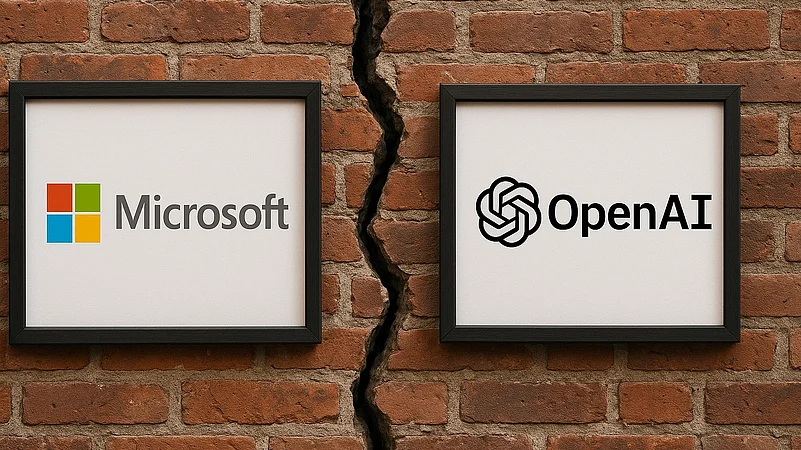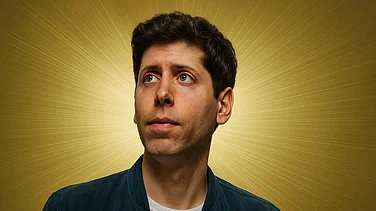The ever‑hailed partnership between ChatGPT maker OpenAI and tech giant Microsoft is reportedly under strain. OpenAI is contemplating a federal antitrust complaint against Microsoft, alleging that it enjoys monopolistic control over OpenAI’s infrastructure, products and future direction, The Wall Street Journal reported.
This dispute extends beyond financial matters, reflecting a broader struggle for control over AI’s future. If unresolved, it could lead to legal action, regulatory intervention or the potential dissolution of a partnership that began with Microsoft’s $1 billion investment in OpenAI in 2019.
As per the report, OpenAI executives have discussed a “nuclear option” of accusing Microsoft of anti‑competitive behaviour in their partnership.
This consideration stems from tensions over control of OpenAI’s infrastructure, products and future direction. The potential actions include launching a public campaign to highlight these concerns and seeking a federal regulatory review of their contract with Microsoft for possible antitrust violations.
The partnership between OpenAI and Microsoft previously experienced significant challenges, including when OpenAI’s CEO Sam Altman was removed from the board and stripped of his role. Although the board reversed its decision within days, reinstating Altman as CEO and reorganising the board, this episode highlighted the underlying strain in their relationship.
Underlying Issues
There are three major issues that have reportedly strained the relationship between the two tech giants.
Firstly, OpenAI and Microsoft are in negotiations over the equity structure of OpenAI’s planned transition to a public‑benefit corporation. Microsoft is reportedly pressing for a larger ownership stake in the reorganised entity than OpenAI is prepared to concede.
The deadline for completing the conversion looms at the end of this year. Failure to finalise the change in legal status by 31 December 2025 could jeopardise as much as $20 billion in pledged funding, industry observers warn.
Secondly, both parties are deadlocked over the terms of OpenAI’s $3 billion deal to buy coding startup Windsurf. Under their current agreement, Microsoft can access all of OpenAI’s intellectual property (IP).
Microsoft’s own AI coding tool, GitHub Copilot, competes directly with OpenAI’s offerings, and OpenAI is pushing back to keep Windsurf’s IP out of Microsoft’s hands.
Lastly, OpenAI and Microsoft now face a conflict of interest, competing across products from consumer chatbots to AI tools for businesses. Last year, Microsoft CEO Satya Nadella hired a rival of Altman, who initiated a secret effort to develop AI models for Microsoft.
According to Reuters, OpenAI plans to integrate Alphabet’s Google Cloud service to address its growing compute needs. The deal, under discussion for months, was reportedly finalised in May. It marks OpenAI’s latest effort to diversify its compute sources beyond Microsoft, its primary supporter, including through its high‑profile Stargate data‑centre project.
This move highlights the immense computational demands for training and deploying AI models, reshaping competitive dynamics in the AI industry.
Partnership Timeline
OpenAI and Microsoft first joined forces in July 2019, when Microsoft announced a $1 billion investment and made Azure the start‑up’s preferred cloud provider. The partnership deepened in November 2020 with a multi‑year agreement granting Microsoft rights to commercialise OpenAI’s models, setting the stage for tighter commercial ties.
By March 2021 Microsoft had integrated OpenAI’s GPT‑3 into its Power Platform, bringing AI‑powered low‑code tools to enterprise customers. Ten months later, in January 2022, Microsoft rolled out Copilot across Microsoft 365, embedding OpenAI‑driven assistance into Word, Excel and other productivity apps—one of the first large‑scale deployments of generative AI.
Tensions first surfaced in February 2023 amid reports of internal disagreements at OpenAI over board governance and product‑rollout speed, prompting close scrutiny from its largest investor. By July 2023 the partnership achieved a high‑profile win with the launch of Bing Chat, powered by OpenAI models, demonstrating the consumer appeal of their joint work.
The relationship weathered its biggest shock in November 2023 when OpenAI’s board briefly ousted CEO Sam Altman and Microsoft publicly offered to recruit the displaced team. Altman was reinstated within days and the board restructured, underscoring the commitment on both sides.
In January 2024 Microsoft reaffirmed its support with a fresh $10 billion multi‑year investment. This collaboration accelerated in March 2024 with the unveiling of GPT‑4 Turbo at Microsoft’s Build conference, and in June 2024 OpenAI launched ChatGPT Enterprise on Azure, solidifying a partnership defined by growing investments, deep technical integration and the ability to overcome occasional governance hurdles.


































